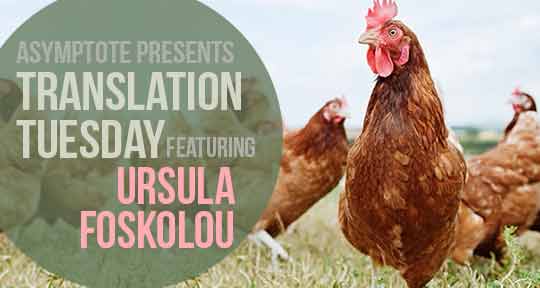This piece comes from a published collection of mostly short prose. Many of the stories draw on themes of childhood, memory, unrequited love, and inner conflict, often using strong imagery of hunger and smells. As a translator, what drew me to the stories was the author’s ability to take ordinary and daily experiences and display them in a way that is surreal or fantastical, with a focus on the physicality of our bodies and the objects around us—and to do it all in very short stories (100-150 words each). In this format the subtle differences in syntax and grammar between Greek and English become particularly pronounced. Foskolou often uses longer sentences with one or more dependent clauses, in a way that is not unusual in Greek but would sound awkward or wrong in English. Similarly, the author uses the Greek past imperfect tense to evoke a sense of time and events, and the emotions that surround these events, that is incomplete, deferred, imperfect. English does not have a past imperfect tense, forcing the translator to use other linguistic devices to create a similar effect.
—Pavlos Stavropoulos
I put the key in the door and I saw them: they were all standing upright and mute by the side of the bed. The relatives, a long coiled queue, were offering their hands and with straight rigid backs they were bowing like chickens. Centered on a hard pillow, my grandmother’s head was cold and in places translucent, like ice that had started to melt. I cleared a path violently and found myself there. The bed smelled from up close: violets, roses, and that earthy smell of old water that you have forgotten in the fridge for months. I lowered myself next to her ear and—speaking—I started to warm her with my breath. Small initially and then wider, the hole was dripping incessantly, soaking the pillow. By midday, she was gone. My grandmother, all of her, flowed into a small basin, and the chickens at her side made a queue to quench their thirst.
Translated from Modern Greek by Pavlos Stavropoulos
Ursula Foskolou was born in Athens in 1986 and works as a graphic designer. She is a permanent collaborator of the literary magazine Frear and curates their website. Her translations and short stories have been published in the literary journals Nea Efthini, Neo Epipedo, To Dendro, (de)kata, Eneken, manifesto, Akti, Thraka, Planodion, and Frear. Her first book, The Cetacean (Το Κήτος, To Kētos), was published in Athens in December of 2016 by Kichlē Publishing House, and received the 2017 New Writer’s Award from Clepsydra Magazine.
Pavlos Stavropoulos was born and raised in Athens, with a Greek father and an American mother. Growing up in a bilingual household meant that translation became second nature. He now resides in Littleton, Colorado, where he works in social and environmental justice education, writes speculative fiction, and translates Greek literature into English.
*****
Want to read more great microfiction like this? Check out our Microfiction Special Feature in the Winter 2018 issue of Asymptote! With translations from Polish, Spanish, French, and Montenegrin (our 100th language!), these pieces are surreal and apocalptic at turns, a place where meaning gleams through the veil of allegory.

